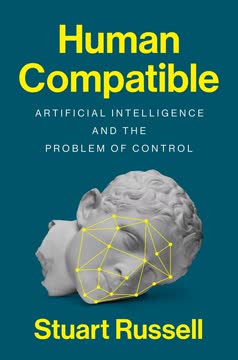Key Takeaways
1. AI is a powerful tool for business efficiency and innovation
"AI eliminates inefficiencies."
AI drives business transformation. It can significantly improve various aspects of business operations, from customer service to manufacturing. AI excels at:
- Automating repetitive tasks
- Reducing human errors
- Providing deeper insights from data
- Increasing profits through cost reduction and revenue generation
Examples of AI applications include:
- Fraud detection in financial services
- Predictive maintenance in manufacturing
- Personalized recommendations in e-commerce
- Automated customer support in various industries
2. Understanding AI fundamentals is crucial for successful implementation
"By far, the greatest danger of artificial intelligence is that people conclude too early that they understand it."
AI literacy is essential. Business leaders need a solid grasp of AI concepts to make informed decisions and avoid common pitfalls. Key areas to understand include:
- Machine Learning (ML) and its subfields
- The importance of quality data
- The iterative nature of AI development
- Limitations and ethical considerations of AI
Misconceptions to avoid:
- AI will replace all jobs
- AI is 100% accurate
- AI provides instant, incredible results
- AI algorithms are inherently unbiased
3. Preparing your organization for AI requires a holistic approach
"Progress isn't made by early risers. It's made by lazy men trying to find easier ways to do something."
Organizational readiness is critical. To successfully adopt AI, companies must focus on five key pillars:
- Data Readiness: Ensure quality data collection, storage, and accessibility
- Cultural Readiness: Foster an AI-friendly mindset across the organization
- Skills Readiness: Train and upskill employees in AI-related competencies
- Infrastructure Readiness: Invest in necessary computing resources and tools
- Budget Readiness: Allocate sufficient funds for AI initiatives
Steps to jumpstart AI adoption:
- Identify AI readiness gaps
- Find high-impact AI initiatives
- Develop a short-term AI strategy
- Track progress, adjust, and iterate
4. Identifying high-impact AI initiatives is key to success
"Opportunity is everywhere; the key is to develop the vision to see it."
Focus on business-aligned opportunities. To find promising AI initiatives:
- Look for problems that require complex decision-making
- Identify high-workload tasks that could benefit from automation
- Ensure necessary data is available or can be collected
- Consider replacing existing inefficient software automations
Two approaches to discovering AI opportunities:
- Organic discovery: AI solutions emerge from addressing existing business problems
- Proactive discovery: Systematically examine processes and pain points for AI potential
5. Framing AI projects effectively ensures measurable outcomes
"If you can't measure it, you can't improve it."
Clear project framing is crucial. When defining AI initiatives:
- Articulate the pain point and project description
- Identify potential benefits
- Define metrics for Return on AI Investment (ROAI)
- Document data and feasibility notes
Components of effective AI project framing:
- Specific problem statement
- Quantifiable goals
- Clear success criteria
- Alignment with business objectives
6. Collaboration between business leaders and AI experts is essential
"People who can focus, get things done. People who can prioritize, get the right things done."
Cross-functional teamwork drives success. Effective AI implementation requires:
- Business leaders to provide domain expertise and strategic direction
- AI experts to assess technical feasibility and guide implementation
- Data engineers to ensure data availability and quality
- Software engineers to integrate AI solutions into existing systems
Key collaboration points:
- Problem definition and scoping
- Data assessment and preparation
- Model development and evaluation
- Post-deployment monitoring and improvement
7. Choosing the right implementation strategy: build, buy, or hybrid
"The secret of getting ahead is getting started. The secret of getting started is breaking your complex overwhelming tasks into small manageable tasks, and starting on the first one."
Implementation approach matters. Consider these options:
-
Buy: Use pre-packaged AI solutions
- Pros: Quick implementation, lower upfront costs
- Cons: May be less tailored to specific needs
-
Build: Develop custom AI solutions in-house
- Pros: Highly customized, full control
- Cons: Requires significant resources and expertise
-
Hybrid: Combine off-the-shelf solutions with custom development
- Pros: Balances speed and customization
- Cons: Requires careful integration
Factors to consider:
- Available budget and timeline
- In-house AI expertise
- Specificity of business needs
- Long-term AI strategy
8. Measuring AI success goes beyond model accuracy
"AI initiatives are meant to solve a problem, not necessarily generate more revenues."
Holistic success evaluation is crucial. Assess AI initiatives based on three pillars:
- Model Success: Evaluate model performance in development and production
- Business Success: Measure impact on organizational objectives using ROAI
- User Success: Assess user satisfaction and adoption of the AI solution
Key considerations:
- Set clear baseline measurements and targets
- Monitor both short-term and long-term metrics
- Address non-model factors that may impact success
- Continuously gather and act on user feedback
9. Continuous evaluation and iteration are vital for AI initiatives
"AI development and feasibility analysis of AI initiatives is a separate cost."
AI is an ongoing process. To ensure long-term success:
- Regularly monitor model performance and business impact
- Gather and analyze user feedback
- Identify areas for improvement and refinement
- Iterate on models and implementation strategies
Stages of AI evaluation:
- During development
- Post-development testing (PDT)
- Initial deployment
- Ongoing production use
By following these key takeaways, organizations can effectively leverage AI to drive innovation, improve efficiency, and gain a competitive edge in their industries.
Last updated:
FAQ
What's The Business Case for AI about?
- Comprehensive Guide: The book by Kavita Ganesan is a detailed guide for business leaders on integrating AI into their organizations effectively.
- Structured Approach: It is divided into five parts, covering AI thinking, opportunity identification, and implementation, allowing readers to build their understanding progressively.
- Practical Insights: Ganesan shares insights from her extensive AI experience, making it a practical resource for leveraging AI for business growth.
Why should I read The Business Case for AI?
- Demystifying AI: The book addresses common fears and misconceptions about AI, such as job displacement and implementation complexity.
- Actionable Frameworks: It provides frameworks like the HI-AI Discovery Framework to help identify promising AI initiatives, essential for informed decision-making.
- Real-World Applications: Numerous case studies illustrate how AI can improve business processes, making it relevant for leaders across various sectors.
What are the key takeaways of The Business Case for AI?
- AI as a Tool: AI should be seen as a practical tool for enhancing business operations, not just a futuristic concept.
- Preparation is Crucial: Organizations need to focus on data readiness, infrastructure, and culture for successful AI adoption.
- Iterative Process: AI implementation is an ongoing process requiring continuous learning and adaptation.
What are the five pillars of AI preparation mentioned in The Business Case for AI?
- Budget: Allocate sufficient resources for AI initiatives, including technology, talent, and maintenance.
- Culture: Foster a culture that embraces innovation and technology, encouraging collaboration and open-mindedness.
- Infrastructure: Ensure a robust data infrastructure to support AI initiatives, including storage and processing capabilities.
- Data: Access to high-quality, relevant data is critical for training AI models and project success.
- Skills: Invest in training to build a skilled workforce that understands AI and its applications.
What is the HI-AI Discovery Framework in The Business Case for AI?
- Identifying Opportunities: A structured approach to help organizations identify and frame potential AI initiatives.
- Expert Involvement: Involves experts to verify and score initiatives, ensuring alignment with business goals.
- Iterative Process: Encourages refining AI initiatives based on feedback and results for long-term success.
What are the common myths about AI discussed in The Business Case for AI?
- Job Displacement: AI is more likely to augment human capabilities rather than replace jobs entirely.
- Instant Results: AI implementation requires time and effort; it is a long-term commitment.
- Bias-Free Algorithms: Algorithms can perpetuate existing biases in training data, requiring careful monitoring.
How does The Business Case for AI suggest maximizing AI success?
- Understand AI: Leaders should invest time in understanding AI to make informed decisions and set realistic expectations.
- Address Foundational Gaps: Identify and address gaps in data infrastructure and processes before implementing AI.
- Be Clear on ROI: Define clear metrics for measuring the return on investment of AI initiatives.
What is the Machine Learning Development Life Cycle in The Business Case for AI?
- Six Phases: Includes Problem Definition, Data Acquisition, Model Development, Testing, Deployment, and Monitoring.
- Iterative Nature: Feedback from one phase can influence others, essential for refining AI models.
- Collaboration Required: Requires collaboration between leaders, domain experts, and technical teams for successful execution.
What are some real-world applications of AI mentioned in The Business Case for AI?
- Customer Service Automation: AI assistants handle inquiries, reducing workload and improving response times.
- Predictive Maintenance: Used in manufacturing to predict equipment failures, minimizing downtime and costs.
- Churn Prediction: Analyzes customer data to predict churn, helping improve retention rates with personalized offers.
What is the Jumpstart AI approach in The Business Case for AI?
- Strategic Experimentation: Encourages experimenting with AI strategically while addressing readiness gaps.
- Four Steps: Identify readiness gaps, find high-impact initiatives, develop a short-term strategy, and track progress.
- Focus on Learning: Emphasizes learning through experimentation to build AI capabilities gradually.
How can organizations measure the success of their AI initiatives according to The Business Case for AI?
- Model Success: Evaluate AI model performance using metrics for accuracy and effectiveness.
- Business Success: Track return on AI investment to ensure positive contributions to business objectives.
- User Success: Gather qualitative feedback to assess satisfaction and adoption rates.
How does The Business Case for AI address ethical considerations in AI?
- Ethics Committees: Suggests creating committees to oversee AI initiatives and integrate ethical considerations.
- Data Privacy and Bias: Emphasizes addressing data privacy issues and potential biases in AI models.
- User Consent: Encourages considering user consent, especially in applications impacting privacy and rights.
Review Summary
The Business Case for AI receives mostly positive reviews, with readers praising its clear, practical approach to implementing AI in business. Many appreciate the real-world examples, actionable frameworks, and accessible writing style. The book is seen as valuable for both beginners and experienced professionals, offering insights on AI strategy, best practices, and potential pitfalls. Some reviewers note its focus on larger businesses and a few find it basic, but overall, it's considered a helpful guide for understanding and leveraging AI in various industries.
Similar Books






Download PDF
Download EPUB
.epub digital book format is ideal for reading ebooks on phones, tablets, and e-readers.




